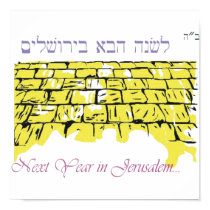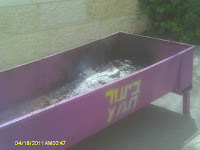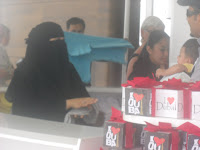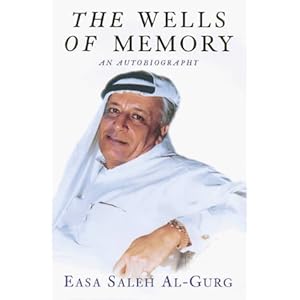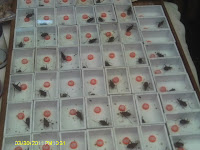JERUSALEM WEEK 2
People We Saw This Week
As in Dubai and China, we feel extremely fortunate to have generous friends all over the world.. Yaron and Tali Lipschitz, who spent three years in Oakland as educators and Shlichim in various capacities, have given us a standing invitation to do our laundry at their house! This is an even bigger deal than it sounds. There are no do-it-yourself laundromats in Jerusalem. They do it for you, and it costs 50-60 shekels per load. You also have to lug it there yourself. So we will not only save about $30 a week, they are even giving us rides back and forth.
 |
| Thank you Yaron and Tali, for the friendship, food, and laundry! |
Yaron's father also owns a restaurant called Eucalyptus in the Artist's Colony (which we hope to try soon), and, given his experience with gourmet food, this was an unbelievably good meal. It was the second night of Passover, but we did not celebrate a 2nd Seder. In Israel, Passover is only celebrated for 7 days, not 8, and therefore there is no "second" day Chag. Micah entertained their 4 year old (he's really amazing with little kids), and we know we will see them often.
Speaking of people we saw, after purchasing three new mattresses and throwing away the three old ones, the apartment smells much better. Smoke smell not entirely removed but almost. Enough so that we invited former TBA members the Kafin's over for Shabbat dinner. They have two boys, one of whom, Toby, is Micah's age, so it was a really nice evening,
Museums
Visiting some of Israel's amazing museums is part of our children's education, so we intend to do many. We are attempting to go in historical order, more or less. Most museums cover many centuries, but still, there's a general order to it. We first went to the Bible Lands Museum, which looks at most of the lands mentioned in the Bible. It follows the Jewish people's journey, starting with ancient Mesopotamia (today's Iraq, where Abraham lived before he got the call from God to go forth to the land of Canaan, today's Israel) and follows the path of the ancient Near East. We saw a similar display in Dubai without a single mention of Israel or the Jewish people. The contrast was striking, and it was nice to follow it from the Jewish people's point-of-view. They also have a great kids activity booklet, which kept the kids engaged. |
| Map of Abraham's journey from Ur to Canaan |
 |
| Taken from the Museum Courtyard |
 |
| The View from the Top |
Shul of the Week: Kehilat Har Horev.
I was originally planning on attending a synagogue called "Yedidya" this week, another left-leaning Modern Orthodox synagogue that was more family-oriented, but when I walked outside for the 23 minute walk, I noticed a whole lot of folks walking with Siddurim. I decided to follow them instead to whatever neighborhood synagogue they going. I ended up at a place called "Kehilat Har Horev," which turned out to also be modern Orthodox, but much more Israeli. The service was Ashkenazic, as were most of the people there, but the pronunciation was Sephardic. I found it relatively easy to follow. While there was more mumbling/davening than at Shira Chadasha, when the congregation did come together to sing, it was lovely. Lots of kavanah (intentionality) in their praying and singing, and I found it quite enjoyable. On Friday, I enjoyed the sing alongable tenor voice of the man who led the evening service. There was also a sermon, all in Hebrew. I understood the majority of the words, since it was about the Haggadah, but I didn't understand what point the speaker was getting at. It may have been my lack of Hebrew knowledge, but when I saw the people on both my right and left sleeping, it may just not really have had a point. On Saturday, I was honored with the hagbah (Torah lifting). I was rather hesitant to accept, since I didn't know the weight of the Torah, but I got lucky. The first of the two scrolls was the light one, and the reading is in the middle of the Torah, so I had no problem. One man with 5 boys was very friendly (he looked like Roxy Bernstein), and the overall atmosphere was vibrant. The downside was that despite a very modern building, they did a very poor job with the Mechitza. It is both elevated and has a curtain, so Karen reported that she could see almost nothing from the Women's Section. (Note from Karen: I actually reported that I could see ABSOLUTELY nothing from upstairs. I didn't know where Mark and the boys were sitting, I couldn't see the Torah, Ark, or people at all. The prayerbooks were only in Hebrew; after about 20 minutes a woman handed me one and asked if I wanted to follow along for Musaf - at least that's what I think she said, to me it sounded like "blah blah blah musaf?" At least I could hear the davening.)
Wines of the Week
With the Seder and Shabbat this week, we had two more Shiraz' to try. The first was a 2008 from Galil Mountain Winery. It was very similar to the Dalton Shiraz. It was full bodied with great spice to it and "berry"ish in flavor. I'd give it an 89.


The second was the 2009 Teva Shiraz from the Benyamina Winery, also located in the Galilee. It was not good. 2009 is too young, but this one doesn't need mellowing with age. It's just way too watery. It had a decent flavor, similar to the others, but no body. It was kind of like wine flavored water. To be fair, this is the lower end offshoot of the Benyamina winery, and sometimes, you get what you pay for. I give it a 70.
Shavua Tov, I hope all our weeks are as wonderful as this one was for us..
